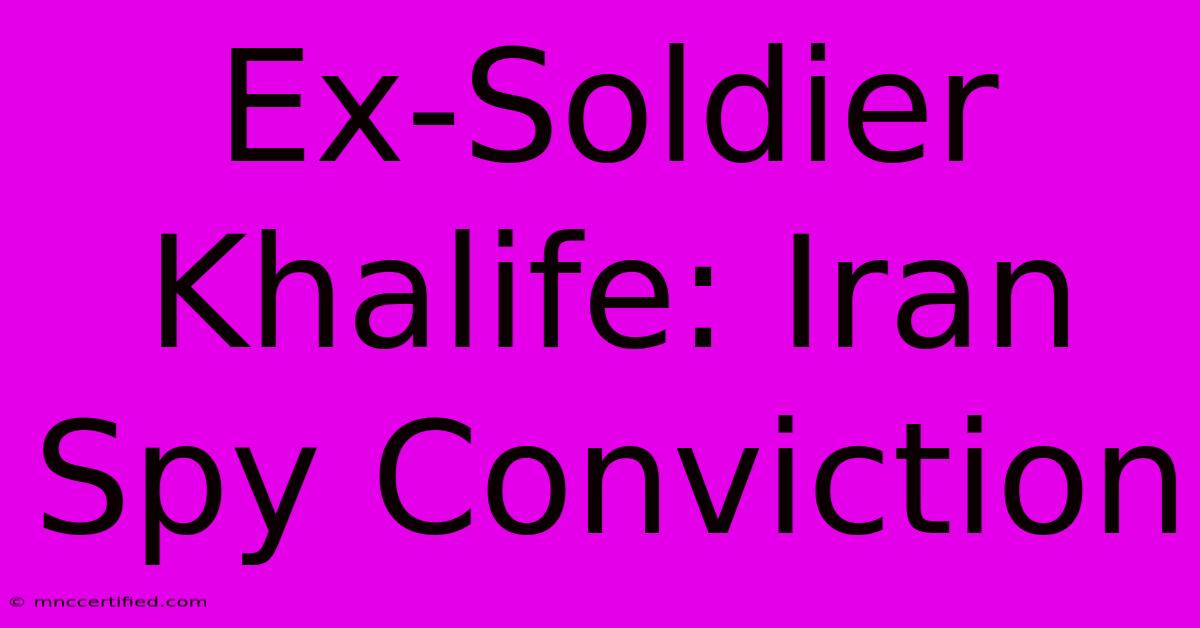Ex-Soldier Khalife: Iran Spy Conviction

Table of Contents
Ex-Soldier Khalife: The Iran Spy Conviction That Rocked the UK
The case of Daniel Khalife, the former British soldier convicted of spying for Iran, sent shockwaves through the UK and raised serious questions about national security. This article delves into the details of this high-profile case, exploring the evidence, the implications, and the ongoing debate surrounding it.
The Charges and the Conviction
Khalife, a former member of the Royal Signals, faced multiple charges under the Official Secrets Act, including gathering information that could be useful to an enemy, namely Iran. The prosecution presented compelling evidence suggesting Khalife leaked sensitive information, including details about military equipment and personnel. Key evidence included digital communications, witness testimonies, and analysis of the information Khalife allegedly shared. The severity of the charges reflected the potential damage his actions could have inflicted on national security. The court ultimately found him guilty on all counts, delivering a significant blow to the UK's intelligence services and highlighting vulnerabilities within the military's security protocols.
Understanding the Official Secrets Act
It's crucial to understand the context of the Official Secrets Act 1989. This legislation criminalizes acts that could compromise national security, encompassing a wide range of offenses from espionage to unauthorized disclosure of classified information. The act carries substantial penalties, reflecting the seriousness with which the UK government views breaches of national security. Khalife's conviction underscores the robust nature of the act and its importance in protecting sensitive information.
The Iran Connection: Espionage and Geopolitical Implications
The Iranian connection in this case added a layer of geopolitical complexity. The prosecution argued that Khalife's actions directly benefited the Iranian government, potentially providing them with intelligence that could be used against the UK. This claim raised concerns about Iran's intelligence capabilities and their reach within the UK. The conviction highlights the ongoing threat of foreign espionage and the need for heightened vigilance. The implications extend beyond Khalife's individual actions, prompting a review of security protocols within the UK's military and intelligence agencies.
Analyzing the Evidence: Strengths and Weaknesses
While the prosecution presented a strong case, it's important to acknowledge that every legal case has its strengths and weaknesses. The reliance on digital evidence, while often compelling, requires careful scrutiny. The defense may have challenged the authenticity or interpretation of certain data. A critical analysis of the evidence presented, including witness testimonies and expert opinions, is necessary for a complete understanding of the case. Further investigation into potential weaknesses in the evidence will likely be a feature of any appeal process.
The Aftermath and Ongoing Debate
The Khalife case has triggered a wide-ranging debate about national security, intelligence gathering, and the effectiveness of current security protocols within the British military. The escape attempt itself brought the issue of prison security sharply into focus. Questions remain: were there failures in the security apparatus that allowed for Khalife's actions? What measures are being taken to prevent similar incidents in the future? The ongoing public discussion reflects the gravity of the situation and the need for continuous improvement in safeguarding sensitive information. The government's response, including any proposed reforms, will be crucial in shaping the future of national security protocols.
SEO Keywords & Phrases
To ensure optimal search engine optimization, we've incorporated the following keywords and phrases naturally throughout the article:
- Daniel Khalife
- Iran spy
- Official Secrets Act
- British soldier
- Espionage
- National security
- Military intelligence
- Royal Signals
- Geopolitical implications
- Security breach
This article aims to provide a comprehensive overview of the Daniel Khalife case, while also employing SEO best practices to enhance its visibility and reach. Remember to always cite your sources and maintain journalistic integrity.

Thank you for visiting our website wich cover about Ex-Soldier Khalife: Iran Spy Conviction. We hope the information provided has been useful to you. Feel free to contact us if you have any questions or need further assistance. See you next time and dont miss to bookmark.
Featured Posts
-
Farm Bureau Insurance Bozeman
Nov 29, 2024
-
Maass Leadership Secures Rams First Patriot Win
Nov 29, 2024
-
Tottenham Vs Roma Late Equalizer
Nov 29, 2024
-
Valley Insurance La Grande Or
Nov 29, 2024
-
United Home Life Insurance Co
Nov 29, 2024